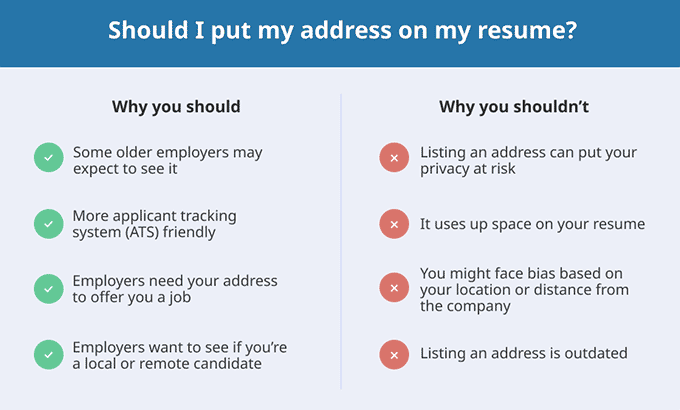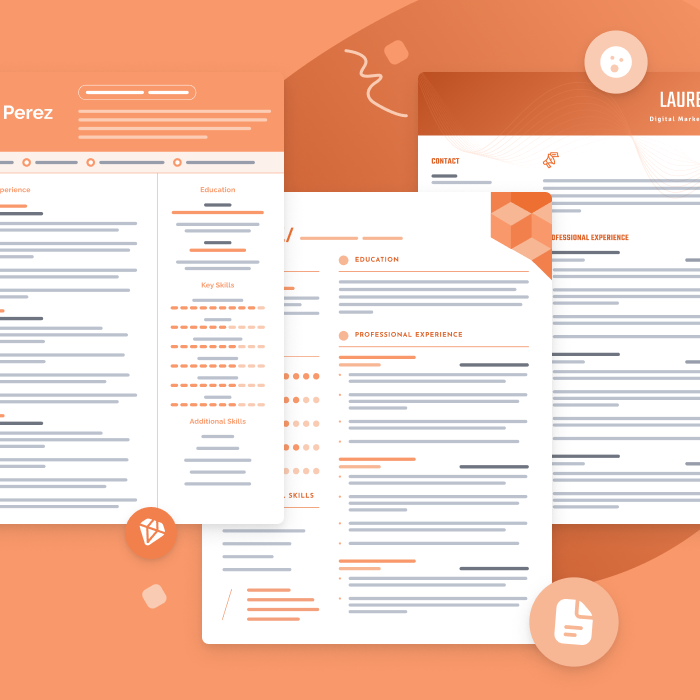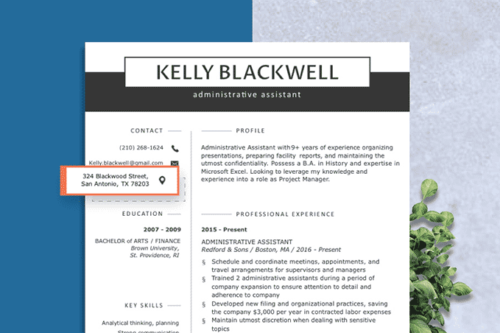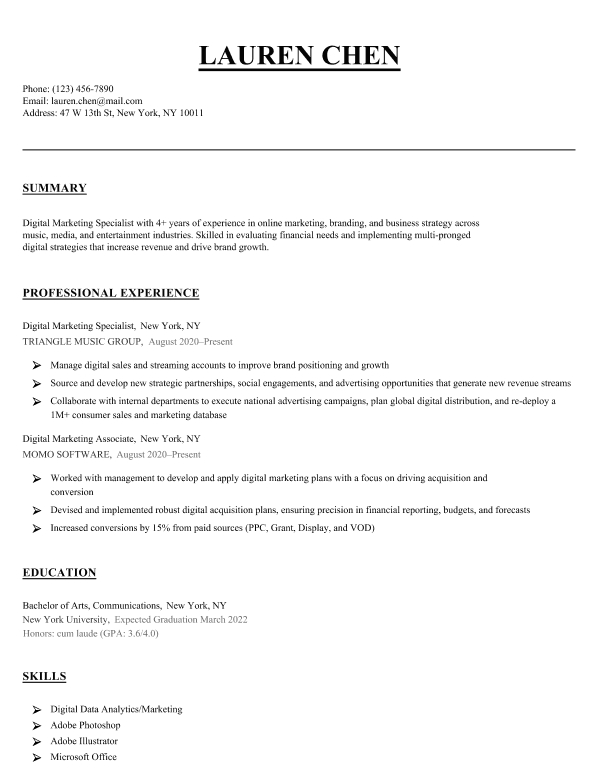You should put your address on your resume only if you think it will improve your chances of being hired, but usually it’s not necessary.
Traditionally, including your address when you write your resume was standard practice because employers would reach out to you via physical mail.
Today, most (if not all) jobs handle hiring communication through email or online portals. For that reason, listing a mailing address on your resume is no longer necessary.
However, there are still reasons you may want to put an address in the contact information section of your resume, and in some cases it can even improve your chances of being hired. So before you make a decision, we explain each reasons to include (or exclude) your address, and clearly explain how to write your address on your resume.

Our free-to-use resume builder can make you a resume in as little as 5 minutes. Just pick the template you want, and our software will format everything for you.
Reasons to include your address on a resume
✅ Some older employers may expect to see it
One reason you might want to include an address on your resume is simply that some employers will want to see it listed somewhere in your application.
Many older hiring managers prefer to immediately know where the candidate they’re looking at resides, even if they don’t need this information for practical reasons.
In some rare cases, if you don’t put an address on your resume it could be seen as a red flag by hiring managers, and leave them questioning why you left it off. So if you’re applying to an older, more traditional company, it’s safer to include an address on your resume.
✅ Addresses are preferred by applicant tracking systems (ATS)
Applicant tracking system (ATS) software is used by large companies to sort through all of the resumes sent in by applicants.
Essentially, ATS software scans your resume for important information and industry-specific keywords to determine if you’re qualified or not. If the ATS can’t find what it’s looking for on your resume, your application could be rejected.
Many career experts believe that including an address makes your resume ATS friendly, and reduces the risk that your application will be unnecessarily disqualified.
However, ATS software has come a long way since it entered the mainstream over 20 years ago, and is now highly efficient at scanning different types of resumes. There’s no evidence we could find that any modern ATS system would reject your (otherwise) perfect resume just because there isn’t an address listed on the page.
If you want to ensure that your resume will be read correctly by ATS, put it through a resume parser before submitting it.
✅ An employer will need your address if they want to provide you a job offer
If you’re offered a job by a company, their HR department will eventually need your full address to complete payroll documents, run background checks, and verify your identity.
Listing your address on your resume simply makes it easier for your future employer to find the information they need and get you started at your new job, which they’ll probably appreciate.
However, most HR departments reach out after you’ve been offered a position to verify your full address anyway, so it’s unlikely any employer would reject your initial application for not having an address listed.
✅ Employers want to verify whether you’re a local or remote applicant
While fully remote jobs are more common than ever, most employers still expect you to commute to work or at least be in the same timezone as them.
In some situations, clearly listing your address on your resume can help win over employers by showing them that you already live in their area and won’t need to relocate. While this won’t automatically win you any jobs, it can sometimes be just enough to convince employers to hire you over another equally qualified candidate.
Additionally, many employers (especially those interviewing candidates nationwide) prefer not to hire candidates who need to relocate because the risk of them leaving the job early due to homesickness or other factors might be higher.

The best resume templates for 2024
One of the best ways to make your resume is by filling out one of our free resume templates. All our templates are designed by experts and free to download for Microsoft Word or Google Docs.
Reasons not to include your address on a resume
❌ Listing an address is an outdated practice
Today, very few people use a physical mailing address as their primary communication method, especially in professional situations.
In most instances, employers only need your email or cellphone number to contact you. Simply put, modern technology makes listing your address on a resume unnecessary.
❌ Putting your address creates unnecessary risk
If you’re applying for your job through a third party, like a job search board, you may feel anxious about writing your address because you’re not sure who will have access to the information you list on your resume.
In this situation, it’s perfectly acceptable to remove your address from your resume to protect your privacy.
❌ Distance bias
If a company is looking for local talent or you’re applying for a job that requires you to relocate, including a non-local address might make hiring managers hesitant to reach out to you.
It’s well known that long commutes have a detrimental effect on employee health and productivity, and some employers avoid hiring people altogether if they suspect they need to commute a long distance to get to work.
Additionally, if you’re applying for a job that’s fully remote, employers may want to avoid hiring you because you live in a different timezone from the rest of the employees at the company.
❌ Location bias
If you live in a certain zip code or neighborhood that some people consider to be undesirable, you may want to avoid listing your address on your resume to prevent discrimination.
While employment discrimination based on race, religion, or sex is prohibited under U.S. law, discrimination based on suspected socioeconomic status is difficult to prove and not uncommon.
If you suspect you could be discriminated against based on the zip code or area you live in, it’s better not to put your address on your resume and simply provide that information later in the hiring process.
❌ Your address takes up space on your resume
If you have more than a few years of professional experience and are trying to write a one page resume, you know that every bit of space on the page is important.
A full address takes up a lot of valuable real-estate in your resume header, and it can either push your resume onto a second page or mess up your resume’s layout. If your formatting is just a little bit off, it’s better not to include your address on your resume so you can keep the page clean and easy to read.
Additionally, cutting your address frees up space to include other information in your header that might be more relevant in today’s job market, like your LinkedIn profile or a link to your portfolio.
If you’re still struggling to get your resume onto one page after cutting your address, try reducing the size of your resume margins.
How to write your address on your resume
If you’ve decided you want to include an address on your resume, you should know how to do it properly. Fortunately, it’s pretty simple.
You can either write your full address (street address, city, state, and zip code) or just the city and state you live in. Either way is perfectly acceptable, and provides the hiring manager with all the information they need to make a hiring decision.
Here’s an example of a resume with the full address listed:

Now, here’s an example of a resume with a shortened address including just the city and state:

If you’re relocating
If you’re not currently living in the same area as the job you’re applying for but plan on relocating soon, you should list your address on your resume in a slightly different way.
Simply include a line that states “Relocating to City, State in Month, Year” instead of your current address. This assures hiring managers that you’re a viable candidate, despite not living in the area.
Here’s an example of how to list your address on a resume if you’re relocating:

If you’re willing to relocate for a job, you should also include a relocation cover letter with your application to fully explain your situation and increase your chances of landing the position.
Click to rate this article
4.7 Average rating
















